Related Research Articles
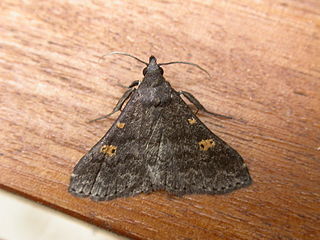
Naarda is a large genus of erebid moths currently encompassing 108 species. Initially identified by Francis Walker in 1866, it is in the family Erebidae. Somewhat ruddy in appearance, this genus is distinguishable for its generally slender thorax and abdomen, and straight, porrect labial palpi. Most species are a light tan color, but shading can reach as deep as a charcoal, with muddy yellow, conspicuous reniform, orbicular stigmata featured on the forewings, sometimes reflected bilaterally superior.
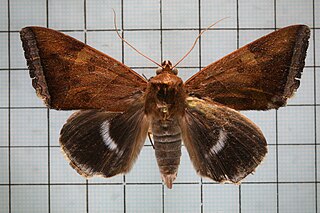
Artena dotata is a species of moth of the family Erebidae. It is found from the Indian subregion to Sri Lanka, Taiwan, Japan, Sumatra and Borneo.

Scopula divisaria is a moth of the family Geometridae. It is found from the Indian subregion, Sri Lanka to Taiwan and Sulawesi.
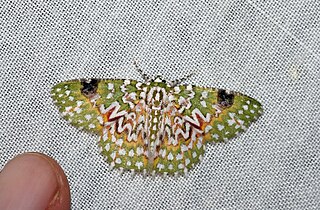
Eucyclodes gavissima, the Oriental orange banded green geometer moth, is a species of moth of the family Geometridae described by Francis Walker in 1861. It is found in the Indian subregion, Sri Lanka, Bhutan, western China, Taiwan, Vietnam, Sumatra and Borneo.

Oraesia emarginata is a species of moth of the family Erebidae first described by Johan Christian Fabricius in 1794. It is found in Australia, New Caledonia, Indonesia, New Guinea, Pakistan, the Philippines, India, Sri Lanka, Sulawesi, Taiwan, China, Japan, Korea and Nepal as well as Eritrea, Ethiopia, Kenya, Namibia, Nigeria, South Africa, Tanzania, the Gambia, Uganda, Oman and Yemen.
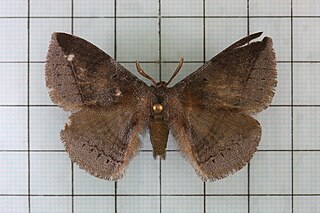
Ganisa postica is a moth of the family Eupterotidae described by Francis Walker in 1855. It is found in India, Myanmar, Sri Lanka and Taiwan.
Calesia fuscicorpus is a moth of the family Noctuidae first described by George Hampson in 1891. It is found in India and Sri Lanka. Caterpillars are known to feed on Justicia wynaadensis. The male has a significant area of dense, raised scales that obscure the white discal spot and other markings.
Episparis liturata is a moth of the family Noctuidae first described by George Hampson in 1893. It is found in India, Sri Lanka, Java, Borneo, Myanmar, China and Thailand.
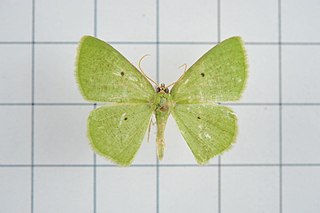
Aplochlora vivilaca is a moth of the family Geometridae first described by Francis Walker in 1861. It is found in Sri Lanka, Indian subregion, Taiwan, Borneo and Sulawesi.
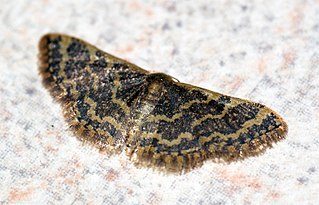
Idaea purpurea is a moth of the family Geometridae first described by George Hampson in 1891. It is found in India, Sri Lanka, Taiwan, the Andaman Islands, Peninsular Malaysia and Borneo.
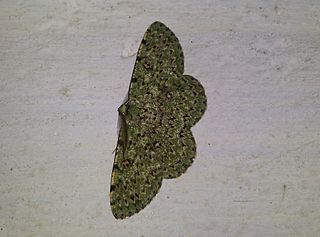
Ophthalmitis herbidaria is a moth of the family Geometridae first described by Achille Guenée in 1858. It is found in China, India, Sri Lanka, Nepal, Hong Kong and Taiwan.
Semiothisa ozararia, is a moth of the family Geometridae first described by Francis Walker in 1860. It is found in the Indian subregion, Sri Lanka, Taiwan, Borneo, Sumatra and Java.
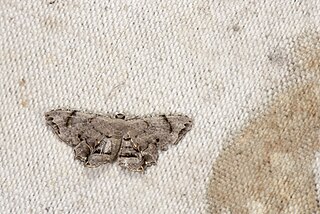
Dysaethria fulvihamata is a moth of the family Uraniidae first described by George Hampson in. It is found in Sri Lanka, Taiwan, Hong Kong, the Ryukyu Islands and Borneo.
Dysaethria scopocera is a moth of the family Uraniidae first described by George Hampson in 1896. It is found in Sri Lanka, Taiwan, Malaysia and Borneo.
Phycidopsis albovittata is a moth of the family Notodontidae first described by George Hampson in 1893. It is found in Sri Lanka, India, Sundaland, Luzon in the Philippines and Sulawesi.
Tathodelta purpurascens is a moth of the family Noctuidae first described by George Hampson in 1893. It is found in India, Sri Lanka, Borneo and Bali.

Progonia kurosawai is a moth of the family Noctuidae first described by Owada in 1987. It is found in Japan, Sri Lanka, Taiwan, Nepal, Myanmar, Borneo and Sulawesi.

Corythurus nocturnus is a moth of the family Noctuidae first described by George Hampson in 1893. It is found in Sri Lanka and Borneo.

Rivula basalis is a moth of the family Erebidae first described by George Hampson in 1891. It is found in South India, Sri Lanka, Indo-China, Thailand, South China, Taiwan, Java, Bali and Borneo.
Earias luteolaria is a moth of the family Nolidae first described by George Hampson in 1891. It is found in India, Sri Lanka, Borneo, Hong Kong and Australia.
References
- ↑ "Species Details: Metorthocheilus emarginata Hampson, 1891". Catalogue of Life. Retrieved 28 March 2018.
- ↑ Koçak, Ahmet Ömer; Kemal, Muhabbet (20 February 2012). "Preliminary list of the Lepidoptera of Sri Lanka". Cesa News. Centre for Entomological Studies Ankara (79): 1–57 – via Academia.
- ↑ "Chundana emarginata (Hampson, 1891) 凹緣雙尾蛾". Taiwan Biodiversity Information Facility. Retrieved 28 March 2018.
- ↑ "Chundana emarginata Hampson comb. n." The Moths of Borneo. Retrieved 28 March 2018.
- ↑ "HOSTS - a Database of the World's Lepidopteran Hostplants". The Natural History Museum. Retrieved 28 March 2018.